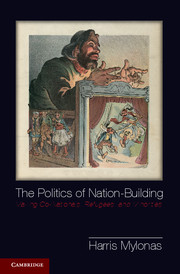Book contents
- Frontmatter
- Contents
- List of Figures, Maps, Tables, Graph, and Illustrations
- Acknowledgments
- List of Abbreviations
- Preface
- 1 Introduction
- Part I Theory
- Part II Empirical Evidence
- 3 Why the Balkans?
- 4 Cross-National Variation
- 5 Odd Cases
- 6 Subnational Variation
- 7 Temporal Variation
- 8 Application of the Theory Beyond the Balkans
- 9 Conclusion
- Methodological Appendix
- References
- Author Index
- Historical Name Index
- Subject Index
- References
8 - Application of the Theory Beyond the Balkans
Published online by Cambridge University Press: 05 January 2013
- Frontmatter
- Contents
- List of Figures, Maps, Tables, Graph, and Illustrations
- Acknowledgments
- List of Abbreviations
- Preface
- 1 Introduction
- Part I Theory
- Part II Empirical Evidence
- 3 Why the Balkans?
- 4 Cross-National Variation
- 5 Odd Cases
- 6 Subnational Variation
- 7 Temporal Variation
- 8 Application of the Theory Beyond the Balkans
- 9 Conclusion
- Methodological Appendix
- References
- Author Index
- Historical Name Index
- Subject Index
- References
Summary
Can my argument help us shed light on shifts in nation-building policies toward non-core groups in other parts of the world? Does it provide us with insights beyond the interwar period? In Chapters 4 through 7 I have provided empirical support for my argument based on evidence from the early twentieth-century Balkans, a place described as chaotic, captivated by ethnic hatreds where there is a strong presumption against the logic of my argument. In this section I explore the extent to which the theory can help us explain variation in nation-building policies beyond the Balkan region and outside the interwar period.
The ideal – but hardly feasible or ethical – test would require me to conduct an experiment. A second best would be to construct a global panel dataset on nation-building policies toward all non-core groups living in states with ruling political elites of clearly defined core groups that were motivated by a homogenizing imperative. However, in order to identify the extent to which my argument may apply across space and time, challenging causal links have to be established. For example, we would need to determine whether there was external involvement in support of a non-core group – a particularly challenging task especially when dealing with covert or clandestine operations. Moreover, we would need data on whether this external involvement actually affected the choice of nation-building policies toward the non-core group. Existing secondary literature on nation-building policies is very limited and in most cases archival research is necessary to establish these causal links for a global dataset. Moreover, archival material is rarely accessible; most governments keep such information confidential for many years while others destroy it altogether.
- Type
- Chapter
- Information
- The Politics of Nation-BuildingMaking Co-Nationals, Refugees, and Minorities, pp. 170 - 186Publisher: Cambridge University PressPrint publication year: 2013



